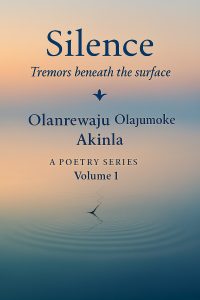Poet, storyteller, and chronicler of quiet courage
 Olanrewaju Olajumoke Akinla is not afraid of quiet. In fact, she listens to it with intent. Her debut chapbook, Silence: Tremors Beneath the Surface – Volume One, is a poetic excavation of gendered violence and the resilience that rises from its shadows. Her prose work, I Want to Be a Writer, is a reflective journey through migration, identity and the struggle to claim one’s voice. England-based but Nigerian at heart, Olanrewaju’s writing is lyrical, layered and unflinchingly honest.
Olanrewaju Olajumoke Akinla is not afraid of quiet. In fact, she listens to it with intent. Her debut chapbook, Silence: Tremors Beneath the Surface – Volume One, is a poetic excavation of gendered violence and the resilience that rises from its shadows. Her prose work, I Want to Be a Writer, is a reflective journey through migration, identity and the struggle to claim one’s voice. England-based but Nigerian at heart, Olanrewaju’s writing is lyrical, layered and unflinchingly honest.
With academic roots in International Law & Diplomacy and Creative Writing, studied across Nigeria and England, she brings a cross-cultural lens to her storytelling. Her work has been presented in community and literary spaces, and she remains committed to amplifying diverse voices through craft and conversation. We reached out to Olanrewaju to discuss silence, survival, and the transformative power of language.
Your chapbook ‘Silence’ explores gendered violence through poetic form. What drew you to this subject, and why poetry as the medium?
Gendered violence is a universal issue, and I wanted to open a conversation that feels accessible to everyone. Poetry gives me the freedom to reshape difficult experiences into a form people can connect with gently and intimately. Its openness allows complex truths to be told with clarity and emotional depth.
How do you navigate the tension between personal storytelling and broader social commentary in your work?
First, I like to distance myself from my work unless it’s a narrative I intentionally choose to make open. Even so, my writing naturally blends personal observations with broader conversations. I maintain balance by keeping each context distinct so they can coexist without losing clarity.
In ‘I Want to Be a Writer,’ you reflect on migration and belonging. How has your own cross-cultural experience shaped your voice as a writer?
My cross-cultural experience has added depth, audacity, and authenticity to my writing voice. Being an active participant in different cultures has enriched my perspective and strengthened my voice, allowing me to write with confidence, nuance, and boldness.
Silence is portrayed both as a shield and a wound. How do you interpret silence in your own life and creative process?
Silence is a tool, and people use it differently. For me, I employ it to step back, reflect, or let matters unfold. For others, it might serve as a defence mechanism or a sign of helplessness—its meaning always depends on the context. Creatively, silence enhances my imagination. With quietness, my mind becomes active, thinking, imagining, and generating ideas that shape my writing.
Your writing blends memoir, observation and storytelling. How do you decide which form best serves a particular theme or narrative?
It depends on what I want a scene to achieve. I use observation to immerse readers in real-time incidents, sometimes using short beats or a staccato style to heighten emotion. Storytelling works best for flashbacks, memoir for deeply personal experiences, and poetic form for complex scenes.
What challenges have you faced in developing longer-form narratives, and how do you maintain creative clarity across them?
Longer-form narratives aren’t a challenge for me – my stories drift by design. You’ll find pockets of stories within a story, with shifts in time, place, and perspective that add density and depth. To maintain creative clarity, I let each scene or chapter hold its own semantic field while still leaning into the work’s central thematic concern. Every chapter carries a natural arc and end, and I maintain a consistent voice throughout.
You’ve studied both International Law and Creative Writing. So, how do these disciplines inform each other in your work?
My studies in International Law and History give me a wide lens for creative writing. I can draw material from unexpected places, juxtaposing the literal with the metaphorical – sometimes using legal concepts as allegory in a poem. This interplay helps me reframe complex issues in clear, lyrical and surprising ways.
What role does community engagement play in your writing practice, and how do you see literature as a tool for social change?
Community engagement fosters participation in my work. It helps me gauge relatability and opens up new perspectives, deepening both thought and conversation. Welcoming other voices adds texture and robustness to my writing. Literature is a powerful tool for social change – it creates, spreads and sustains awareness on important matters. It opens difficult conversations and holds space for reflection. Most of all, literature is an archive: a form of memory that preserves what might otherwise be forgotten.
As someone committed to amplifying diverse voices, what advice would you give to emerging writers navigating identity and representation?
Be genuine. Own your truth and your voice – respectfully and unapologetically. Listen deeply to the communities you write about, honour their experiences, and allow your own perspective to coexist with theirs.
Looking ahead, what themes or questions are you most eager to explore in your forthcoming novella and future projects?
In my forthcoming novella, I’m eager to explore the experiences of diasporans—their journeys of migration and the process of becoming. For future projects, I plan to expand Silence. While Volume One ended with the recruitment of victims into an army, Volume Two will follow their journey, witnessing the process of healing, transformation, and ultimately, redemption.
Interview arranged by Segun Martins Fajemisin
Photo credits: Olanrewaju Olajumoke Akinla
Olanrewaju’s work is available via ola93.gumroad.com. Follow her journey as she continues to shape stories that speak truth to silence.


